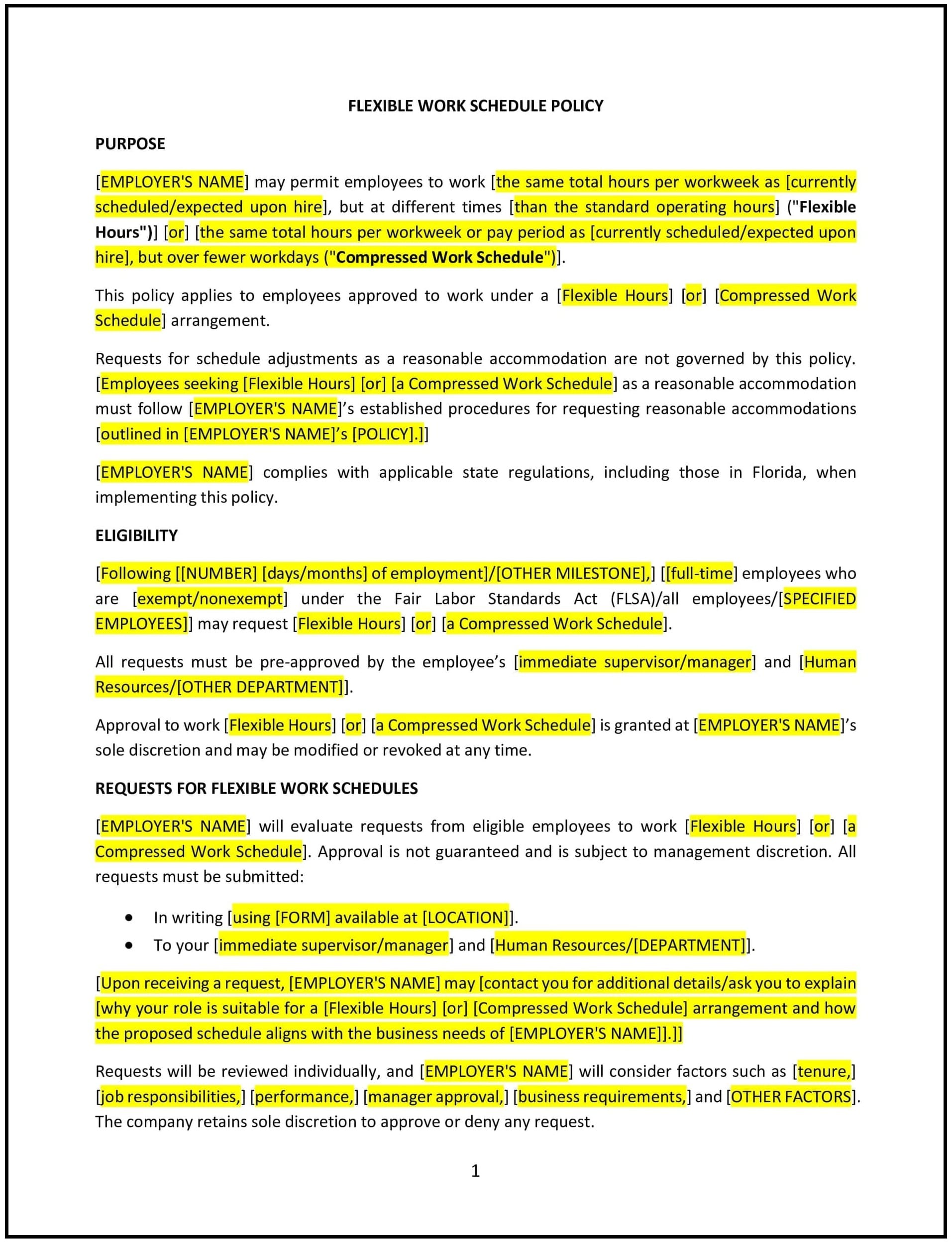Flexible work schedule policy (Florida): Free template
Got contracts to review? While you're here for policies, let Cobrief make contract review effortless—start your free review now.

Customize this template for free
Flexible work schedule policy (Florida)
A flexible work schedule policy helps Florida businesses support employees in balancing their professional and personal responsibilities by offering adaptable work arrangements. This policy outlines procedures for requesting, approving, and managing flexible schedules while maintaining operational efficiency. It is designed to promote work-life balance, reduce stress, and provide clear guidelines for implementing flexible work options.
By implementing this policy, businesses in Florida can enhance employee satisfaction, improve retention, and align with the state’s focus on supporting modern, adaptable workplaces.
How to use this flexible work schedule policy (Florida)
- Define flexible work options: Clearly specify the types of flexible arrangements available, such as remote work, compressed workweeks, or flexible start and end times.
- Establish request procedures: Outline how employees should submit requests for flexible schedules, including required documentation and timelines.
- Address approval criteria: Explain how businesses should evaluate requests based on factors such as job requirements, team needs, and operational impact.
- Specify expectations: Provide guidelines on performance standards, communication protocols, and availability during flexible work arrangements.
- Communicate the policy: Share the policy with employees during onboarding and through regular communications to ensure awareness and understanding.
- Monitor adherence: Regularly review how flexible schedules are implemented and address any concerns or discrepancies promptly.
- Update the policy: Periodically assess the policy to reflect changes in workplace dynamics, employee needs, or business goals.
Benefits of using this flexible work schedule policy (Florida)
This policy offers several advantages for Florida businesses:
- Promotes work-life balance: Supporting flexible schedules helps employees manage personal and professional responsibilities more effectively.
- Reduces stress: Adaptable work arrangements contribute to a healthier and more motivated workforce.
- Builds trust: A clear policy demonstrates the business’s commitment to employee well-being and flexibility.
- Aligns with community values: Reflects Florida’s emphasis on innovation, adaptability, and mutual respect in the workplace.
- Enhances retention: Offering flexible work options contributes to higher employee satisfaction and loyalty.
- Improves productivity: Employees who feel supported are more likely to remain focused and engaged at work.
- Supports growth: A robust policy facilitates scalable solutions for managing diverse work arrangements.
Tips for using this flexible work schedule policy (Florida)
- Communicate clearly: Ensure employees understand the policy by providing written materials and discussing it during meetings or training sessions.
- Train managers: Educate supervisors on how to evaluate and approve flexible work requests fairly and consistently.
- Be flexible: Allow for reasonable adjustments based on individual needs and job requirements to ensure effectiveness.
- Track usage: Maintain records of flexible work requests and approvals to monitor trends and ensure fairness.
- Stay informed: Keep up with changes in societal norms, workplace expectations, or state-specific guidelines that may affect flexible work practices.
- Encourage feedback: Solicit input from employees to identify areas for improvement and ensure the policy meets their needs.
- Review periodically: Assess the policy’s effectiveness and make updates as needed to reflect changes in workplace dynamics or business goals.